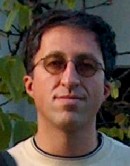|
Plenary
Lecture
Game Based Learning - How Efficient It Might Be?

Associate Professor Boyan Bontchev
Department of Software Engineering
Sofia University
Bulgaria
E-mail:
bbontchev@fmi.uni-sofia.bg
Abstract: Modern technology enhanced learning
methods approach more and more non-traditional
instructional paradigms. Game based learning is probably
the most promising one of them thanks to its high
immersion, motivational power and potential for
efficient teaching. In last decade, the interest in
game-based learning has grown incredibly - on one hand,
fueled by successful professional training by games and
simulations in many industrial and military domains and,
as well, encouraged by recent research and field trials
proving the cognitive benefits of playing educational
games. Pupils, students and adults learn from computer
games in an informal way while playing them alone and/or
collectively. Unlike traditional education, here
learners acquire knowledge and practical skills in game
domain by pursuing a goal in given context by choosing
appropriate actions and taking the risk of their
consequences. Educational games offer virtual
environments closed to real life and facilitate learning
by practice and mistakes. Thus, they keep learners
motivated in acquiring skills and knowledge and engaging
them by practicing in situations closed to real life.
Game-based learning represents a branch of serious games
which relies on game play for increasing learning
outcomes by retaining knowledge and skills and applying
them to the real world. It has started by simple
non-digital games and evolved highly by applying
computer games in educational context. The talk will
reveal possible types of educational computer games,
from simple single-user games up to complex,
collaborative social multiplayer games. It is going to
bring results of many surveys about efficiency of
practical field trials of applying these types of
educational games.
Mass invasion of educational games worldwide is still
not possible due to the lack of cheap and effective
implementations of e-learning games of various types
making use of domain content of given course. For
streamline usage of educational games in future
technology enhanced learning, teachers need software
tools and frameworks for an effective game construction
using course content of particular domain. The talk will
explain how semantic structuring of educational content
might facilitate its usage in game design and may help
rapid and more facile creation of games appropriate for
e-learning purposes.
Finally, the talk will refer to some important aspects
of educational games development such as usage of
intelligent agents participating games as tutors,
collaborators and opponents. Agents are very promising
in embodying innovative strategies for courseware
presentation and various interdisciplinary approaches
dealing with complexity. There will be shown how
intelligent agents may act alone or in cooperative mode
in adaptive way by extracting cognitive, affective,
learning/gaming style and social characteristics of
individual learner.
Brief Biography of the Speaker:
Boyan Bontchev has obtained MSc degree in Computer
Engineering in 1988 at Technical University of Sofia,
Bulgaria, and PhD degree in Parallel Processing at
Bulgarian Academy of Sciences (BAS) in 1993. During his
PhD study, he has specialized in RWTH, Aachen and
University of Vienna. Between 1993 and 2000, Dr.
Bontchev has been researcher at BAS in the area of
dataflow models and architectures and, at the same time,
followed a career of software engineer and consultant
within the OBLOG project initiated by CERN. He has acted
as project manager at many private entities in Portugal,
Spain, Italy and Bulgaria. Since 2001 he runs as
managing director of Bonea Ltd, and since 2003 he is
Associate Professor at Dep. of Software Engineering at
Sofia University. He has participated in many research
and industrial projects, both national and in the scope
of EC FP5/6/7. Currently, he is project coordinator of
the ADOPTA project dealing with adaptive e-learning
platforms for edutainment and game based learning. Dr.
Bontchev is author of more than 90 scientific
publications and runs as invited speaker at European
conferences and PhD schools.
|
